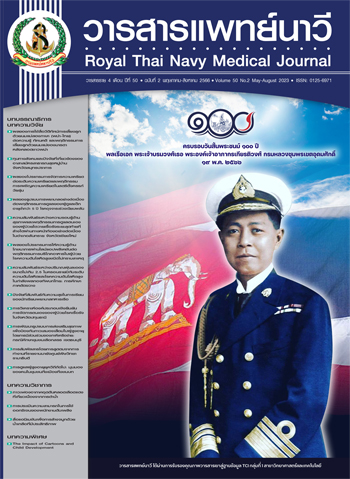Effects of Stress Management Program on Stress Level and Coping Behaviors in Adolescent Pregnant Women
Main Article Content
Abstract
The purpose of this quasi-experimental research study was aimed at investigating the effects of stress management program on stress level and coping behaviors in adolescent pregnant women. The participants were 43 adolescent pregnant women who came at antenatal care unit in Somdech Phra Pinklao Hospital between January 2022 to May 2022 and were divided into an experimental group with twenty samples and a control group with twenty-three samples. The control group received routine care while experimental group received the stress management program in addition to routine care. The research instruments consisted of stress management program, demographic characteristics questionnaire, Perceived Stress Scale (PSS) and Brief COPE inventory. The content validity of all instruments were reviewed by five experts and the Content Validity Index (CVI) yielding values of 0.77 - 1. The reliability of the Perceived Stress Scale (PSS) and the Brief COPE inventory were tested by Cronbach’s alpha coefficient, yielding values of 0.70 and 0.76
The program was implemented in 5 weeks. Data were analyzed using independent t-test to compare mean stress score between the experimental group and the control group and Mann-Whitney U test was used to compare mean coping score.
The results revealed that the experimental group had statistically significantly lower mean scores of stress than the control group (p < .05) and the experimental group had statistically significantly higher mean scores of coping behaviors than the control group (p < .05). Stress management program can help adolescent pregnant women with lower stress levels and higher coping behaviors. Therefore, nurse should apply the stress management program in adolescent pregnant women to reduce stress levels and encourage appropriate coping behaviors during pregnancy.
Article Details

This work is licensed under a Creative Commons Attribution-NonCommercial-NoDerivatives 4.0 International License.
References
World Health Organization. Adolescent pregnancy. [Internet]. [cited 2020 August 11]. Available from https://www.who.int.
Ministry of Public Health. Sexual and reproductive health in adolescent 2019. [Internet]. [cited 2020 August 11]. Available from http://www.rh.anamai.moph.go.th. (in Thai).
Astuti AW, Hirst J, Bharj KK. Indonesian adolescents’ experiences during pregnancy and early parenthood: a qualitative study. J Psychosom Obstet Gynaecol 2020;41(4):317-26.
Barber JS, Kusunoki Y, Gatny H, Melendez R. The relationship context of young pregnancies. Law Inequal 2017;35(2):1-23.
Chareonsanti J. Nursing and midwifery: women during pregnancy. Chiang Mai: Faculty of Nursing, Chiang Mai University; 2020. (in Thai).
Rakers F, Rupprecht S, Dreiling M, Bergmeier C, Witte OW, Schwab M. Transfer of maternal psychosocial stress to fetus. Neurosci Biobehav Rev 2017;117:185-197.
Srisawad K, Panyapinijnugoon C. Stress among pregnant adolescents. Journal of The Royal Thai Army Nurses 2016;17(2):7-11. (in Thai).
Phuakphan W, Siriarunrat S, Suppaseemanont W. Factors related to postpartum depression among mothers of preterm infants. Royal Thai Navy Medical Journal 2020;47(2):432-45. (in Thai).
Lobmaier SM, Muller A, Zelgert C, Shen C, Su PC, Schmidt G, et al. Fetal heart rate variability responsiveness to maternal stress, non-invasively detected from maternal transabdominal ECG. Arch Gynecol Obstet 2020;301(2),405-14.
Lazarus R, Flokman S. Stress appraisal and coping. New York: Spinger; 1984.
Urech C, Scherer S, Emmenegger M, Gaab J, Tschudin S, Hoesli I, et al. Efficacy of an internet-based cognitive behavioral stress management training in women with idiopathic preterm labor: A randomized controlled intervention study. J Psychosom Res 2017;103:140-6.
Jallo N, Thacker Ii LR, Menzies V, Stojanovic P, Svikis DS. A stress coping app for hospitalized pregnant women at risk for preterm birth. MCN Am J Matern Child Nurs 2017;42(5):257-62.
Liu YH, Lee CS, Yu CH, Chen CC. Effects of music listening on stress, anxiety, and sleep quality for sleep-disturbed pregnant women. Women Health 2016;56(3):296-311.
Muthukrishnan S, Jain R, Kohli S, Batra S. Effect of mindfulness meditation on perceived stress scores and autonomic function tests of pregnant Indian women. J Clin Diagn Res 2016;10(4):5-8.
Klomma C, Baosoung C, Sansiriphun N. Effect of social support on stress of pregnant women with preterm labor. Nursing Journal 2017;44(3):9-18. (in Thai).
Jittrapirom A, Chareonsanti J. Effectiveness of education provision and relaxation training program on self-care behaviors, blood sugar levels, and stress among gestational diabetic women. Nursing Journal 2015;42(4):133-145. (in Thai).
Srisawad K. Effect of education provision and relaxation training. [Master’s Thesis, Faculty of Nursing]. Chiang Mai University; 2011. (in Thai).
Saetan C, Kala S, Youngwanichsetha S. Effect of positive thinking and relaxation program on reducing stress among pregnant adolescents. Princess of Naradhiwas University Journal 2018;10(1):27-39. (in Thai).
Kaeomaungfang R, Suppasri P, Siriarunrat S. Effect of yoka training on stress reduction in primiparous pregnant teenagers. Nursing Journal of The Ministry of Public Health 2017;27(1):73-84. (in Thai).
Buahom K, Kala S, Youngwanichsetha S. The effect of progressive muscular relaxation with husband support on stress of teenage pregnant women. Princess of Naradhiwas University Journal 2017;9(2):38-51. (in Thai).
Ellis A. The revised ABC’s of rational-emotive therapy (RET). Journal of Rational Emotive and Cognitive Behavior Therapy 1991;9(3):139-72.
Department of Mental Health. Stress relief guide. [Internet]. [cited 2020 November 30]. Available from https://www.dmh.go.th. (in Thai).
Glass GV. Primary, secondary and meta-analysis of research. Educational Researcher 1976;5(10):3-8.
Cohen S, Williamson G. Perceived stress in a probability sample of the United States. In: Spacapan S, Oskamp S. The social psychology of health: claremont symposium on applied social psychology. Newbury Park, CA: Sage;1988. p. 31-67.
Wongpakaran N, Wongpakaran T. The Thai version of the PSS-10: An Investigation of its psychometric properties. Biopsychosocial Medicine 2010;4(6):1-6.
Carver C. You want to measure coping but your protocol’s too long: consider the brief COPE. Int J Behav Med 1997;4(1):92-100.
Numsang T, Tantrarungroj T. Validity and reliability of the brief COPE Inventory: Thai version. J Psychiatr Assoc Thailand 2018;63(2):189-98. (in Thai).
Astuti AW, Hirst J, Bharj KK. Indonesian adolescents’ experiences during pregnancy and early parenthood: a qualitative study. J Psychosom Obstet Gynaecol 2019;40(4):1-10.

